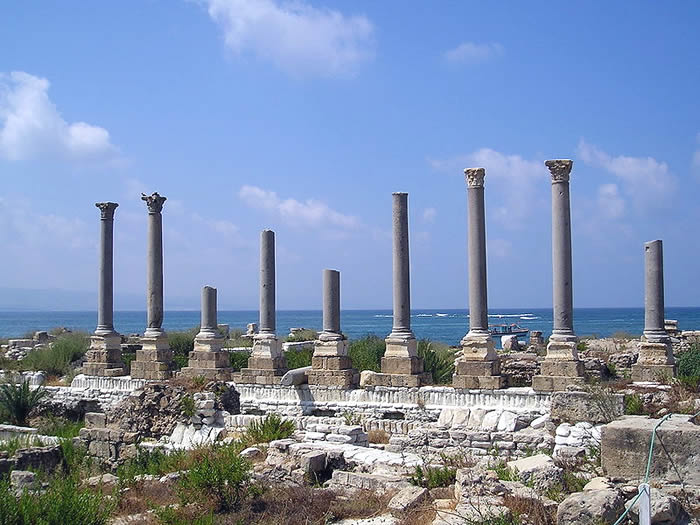[Greek] ἔμπορος (emporos) [Latin] homini negotiatori: merchant, passenger on ship, tradesman, person on a journey (poros), one who buys and sells; Mt.13:45, Rev.18:3,11,15, 23

Remains of the ancient Phoenician city of Tyre on the eastern shore of the Mediterranean Sea. (Present day Lebanon)
Background information:
Greek Hellenism: This term means ship-board passenger, traveler, wayfarer, merchant, trader, importer, dealer, and trafficker. Aeschylus’ Libation Bearers 661 states “And it is time to drop anchor in some houses friendly to all guests.” Euripides’ Alcestis 999 states “Let your wife’s tomb be honored as are the gods, and object of reverence for the wayfarer.” Herodotus’s The Histories 2.39 states “Where there is a market and Greek traders in it, the head (of the sacrifice) is taken to the market and sold, where there is no Greek, it is thrown into the river.” Plato’s Sophist 231d states “First, I believe, he was found to be a paid hunter after the young and wealthy.” Euripides’ Hippolytus 964 states “It is a poor merchant of her own life you make her, then, if she destroyed what was most precious to herself for enmity for you.”
Old Testament: This term refers to the trading of merchandise (goods), traveling about, going about in trade, and trafficking. Ezekiel makes a prophecy about the destruction of the city of Tyre, one of the prosperous trading sites on the eastern shore of the Mediterranean Sea. The ships of Tyre were used to trade and exchange merchandise, linen, spices, grains, dye, and slaves. Merchants often traveled about in selling their wares (merchandise).
All the ships of the sea and their sailors were with you in order to deal in your merchandise (Eze.27:9). The ships of Tarshish were the carriers for your merchandise (Eze.27:25). With the abundance of your wealth and your merchandise, you enriched the kings of the earth (Eze.27:33). Thus you shall live with us, and the land shall be open before you, live and trade in it and acquire property in it (Gen.34:10). Solomon’s import of horses was from Egypt and Kue, and the king’s merchants procured them from Kue for a price (1Kgs. 10:28). Once or twice the traders and merchants of every kind of merchandise spent the night outside Jerusalem (Neh.13:20). Dedan traded with you in saddlecloths for riding (Eze.27:20)
New Testament: This term essentially means a merchant. A parable in Matthew’s gospel shows that the kingdom of heaven is like a merchant searching for fine pearls. The one who understands the supreme value of the kingdom of heaven gives up whatever he must to obtain it. In the 18th chapter of Revelations, the merchants of the earth grew rich from their excessive desire for luxury in Babylon (Rome). Upon the fall of Babylon, these merchants weep for their lost markets (commerce).
Scripture:
“Again, the kingdom of heaven is like a merchant searching for fine pearls.” Mt.13:45
This parable illustrates the highly sought treasure of the kingdom of heaven.
“For all the nations have drunk the wine of her licentious passion. The kings of earth had intercourse with her, and the merchants of the earth grew in her drive for luxury.” Rev. 18:3
Babylon (Rome) is condemned for her immorality, idolatry, and other excesses. With the fall of Babylon, the merchants weep for their lost markets.
Conclusion:
Emporium, pore, negotiate, negotiator
The Greek civilization flourished in part due to its nautical sea trading and commerce. It was interesting to discover that this term refers to more than a trader (merchant). Such examples include travelers, wayfarers, and passengers. One could possibly also include traffickers and mercenaries (for hire). The Silk Road was an ancient network of trade routes that connected the East and West.
In the Old Testament era, simple traders traveled about selling their wares (merchandise). This included linen, spices, livestock, etc. It is interesting to note that the Greek word bussinos, originally means fine linen. As you can see, this word becomes the precursor for the current word ‘business’.
The merchant is used in the parable of the kingdom of heaven to illustrate the great value of heaven. Revelations prophecies the fall of Babylon (Rome). The merchants of earth reveled in the excesses of Babylon. Just like greedy businessmen, these merchants weep for their markets.
There is a new-old saying about sophists: “You can get anything you want, if you help enough other people to get what they want.” This is not wisdom. This is what shady, greedy, and unscrupulous business people do to get ahead, regardless of the consequences.
This is not good business for a person (emporos) on a journey (poros)!
On a more personal level, I also can relate to all those many teenagers who have experienced another difficulty journey with acne (and other skin problems) coming through their pores. You will get through it!
